
Project Gutenberg's A Story Garden for Little Children, by Maud Lindsay This eBook is for the use of anyone anywhere in the United States and most other parts of the world at no cost and with almost no restrictions whatsoever. You may copy it, give it away or re-use it under the terms of the Project Gutenberg License included with this eBook or online at www.gutenberg.org. If you are not located in the United States, you'll have to check the laws of the country where you are located before using this ebook. Title: A Story Garden for Little Children Author: Maud Lindsay Release Date: July 25, 2020 [EBook #62748] Language: English Character set encoding: ISO-8859-1 *** START OF THIS PROJECT GUTENBERG EBOOK A STORY GARDEN FOR LITTLE CHILDREN *** Produced by Linda Cantoni, Charlene Taylor, Tom Cosmas and the Online Distributed Proofreading Team at https://www.pgdp.net (This file was produced from images generously made available by The Internet Archive/American Libraries.)
Transcriber Note
The music scores shown on pages 5 and 6 have been transcribed and saved in Midi, MP3 and MusicMXL formats. A link to each of these formats is provided for the reader's usage.

For Little Children
Books by |
| MAUD LINDSAY |
| A STORY GARDEN for Little Children |
| Illustrated, $1.25 |
| THE STORY-TELLER for Little Children |
| Illustrated in colors, $1.25 |
| BOBBY AND THE BIG ROAD |
| Illustrated in colors, $1.50 |
| LITTLE MISSY |
| Illustrated in colors, $1.50 |
By MAUD LINDSAY and |
| THE JOYOUS TRAVELERS |
| Illustrated in colors and black-and-white, $2.00 |
| THE JOYOUS GUESTS |
| Illustrated in colors, $2.00 |
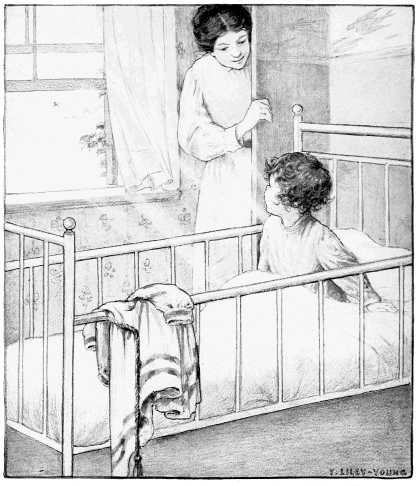
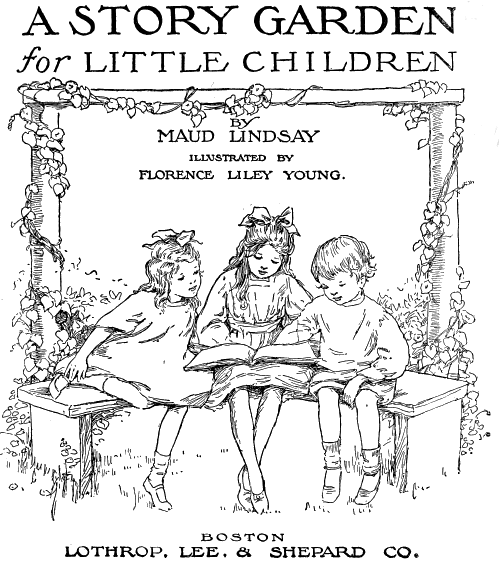
Published, March, 1913
Copyright, 1913, by Lothrop, Lee & Shepard Co.
All Rights Reserved
A STORY GARDEN
Norwood Press
Berwick & Smith Co.
Norwood, Mass., U. S. A.
TO
Lulie Jones
THE FOUNDER OF THE FLORENCE FREE
KINDERGARTEN, AND A LOVER OF
LITTLE CHILDREN EVERYWHERE
To those who know Miss Maud Lindsay's stories for little children,[1] a new collection needs no heralding. She has proved herself gifted with loving insight, literary ability, and spiritual power. Her stories, whether told in kindergarten, school, or Sunday-school, or perused by little readers, have charmed children and touched their hearts.
[1] "Mother Stories" and "More Mother Stories."
The stories in "A Story Garden" are addressed, in the main, to the nursery public—a public in pinafore and rompers,—to the very youngest listeners. Any one who uses them with little children, whether realizing or not the art required for such writing, will find the stories wonderful in their fitness and enduring interest. Repetition only endears them to the « vi » listening child, for, unlike many "simple" stories, which are merely pretty little nothings, Miss Lindsay's have point and truth that the young child can understand.
To invite little children and their retinue of loving attendants to enter "A Story Garden" and enjoy its fair blossoms and wholesome fruit, is a privilege of which I gladly avail myself, because I can unqualifiedly commend Miss Lindsay's stories as the very best I know of for little children. They are by far the best literary product (of their kind) that can be traced to the kindergarten or to the new understanding of childhood that marks our time. Trust them. Use them. They will give joy, refine the taste, enrich the imagination, and gently impel the child toward the True, the Beautiful, and the Good.
Emilie Poulsson.
Children delight in folk-tale and fairy lore, but the very little child loves best the story which mirrors the familiar. And it is for him, and for the mother who is striving in this age of profusion to guard the innate simplicity of her child's nature, that I have written my little stories.
Maud Lindsay.
Sheffield, Ala.
Stories in A Story Garden
![]()
| PAGE | |
| Little Sleepy Head | 1 |
| The Lovely Moon | 4 |
| The Wind's Fun | 7 |
| The Brown Birds | 10 |
| The Stick Horse | 17 |
| "Tickity-Tock" | 20 |
| The Saucer Pie | 23 |
| Thimble Biscuit | 26 |
| The Wee Nest | 29 |
| The Strawberry Shortcake | 32 |
| Good News | 35 |
| The Roll of Bread | 39 |
| Three Guesses | 43 |
| The Snowball | 47 |
| Santa Claus | 51 |
| Ten Pennies | 55 |
| The Lost Doll | 63 |
| Little Dog and Big Dog | 68 |
| The Little King's Rabbits | 77 |
| The Snowman | 84 |
Pictures in A Story Garden
![]()
| LITTLE SLEEPY HEAD | Frontispiece |
| FACING PAGE | |
| THE LOVELY MOON | 4 |
| THE WIND'S FUN | 8 |
| THE BROWN BIRDS | 12 |
| THE STICK HORSE | 18 |
| "TICKITY-TOCK" | 20 |
| THE SAUCER PIE | 24 |
| THIMBLE BISCUIT | 26 |
| THE WEE NEST | 30 |
| THE STRAWBERRY SHORTCAKE | 32 |
| GOOD NEWS | 36 |
| THE ROLL OF BREAD | 40 |
| THREE GUESSES | 44 |
| THE SNOWBALL | 48 |
| SANTA CLAUS | 52 |
| TEN PENNIES | 56 |
| THE LOST DOLL | 64 |
| LITTLE DOG AND BIG DOG | 72 |
| THE LITTLE KING'S RABBITS | 80 |
| THE SNOWMAN | 86 |
FOR LITTLE CHILDREN
![]()
Once upon a time, early in the morning when the sun was just climbing over the hills and all the clouds were rosy pink, a little child lay asleep in his pretty white bed.
"Wake up, wake up," ticked the clock that stood on the mantel. "Wake up, wake up;" but the child did not hear a word that it said.
"I'll wake him up," said a bird that lived in a tree close by the window. "He throws me crumbs to eat every day, and I will wake him with a song." So the bird sat in the tree and sang and sang, "Wake up, dearie, dearie, dearie," till all the birds in the garden « 2 » waked up and sang with her; but the little child slept on in his pretty white bed.
He was still asleep when the wind from the South blew through the garden. "I know this little child," said the wind. "I turned his windmill for him yesterday, and I will blow through the window and wake him with a kiss." So the wind blew through the window and kissed him on both cheeks, and blew his curls about his face; but the child did not stir in his pretty white bed.
"He is waiting for me to call him," said the rooster in the barnyard. "Nobody knows him so well as I, for I belong to him, and I will wake him." So the rooster stood on the fence and flapped his wings, and crowed:—
He waked the yellow chickens and the old hen, the pigeons in the pigeon-house, and the little red calf in the barn. Even the lambs in the meadow heard his call; but he did not wake the little child, though he crowed till he was hoarse.
Now by this time the sun was bright in the sky. It shone over the hills and the meadows. It shone in the barnyard where the noisy rooster crowed and in the garden where the birds sang, and it shone through the window right into the little child's face. And then the little child opened his eyes! "Mamma, Mamma," he called; and his mamma came in at once to dress him. "Who waked my baby child?" asked she; but nobody answered, for not even little Sleepy Head himself knew that it was the sun.
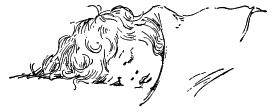
Once upon a time there was a little child who did not want to go to bed.
"The yellow chickens are all asleep," said his mother, as she undressed him. "I heard the old hen calling them, cluck, cluck, cluck, before you had eaten your supper."
"But I do not want to go to sleep," said the child.
"The pigeons are all asleep," said his mother, "up in the pigeon house. 'Coo-roo, coo-roo, good-night,' they said, then tucked their heads under their wings."
"But I do not want to go to sleep," said the child.
"The little red calf is asleep in the barn," said the mother; "and the lambs are asleep on green clover beds;" and she put the child into his own white bed.
It was a soft downy bed close beside a window, but the child did not want to lie there. He tossed about under the coverlet, and the tears were beginning to run down his cheeks when, all at once, the moon looked in at the window.
"There!" said his mother. "The moon has come to tell you good-night. See how it is smiling."
The moon shone right into the child's eyes. "Good night, little child, sleep well," it seemed to say.
"Good night," said he; and he lay still on his bed, and watched the moon while his mother sang:—
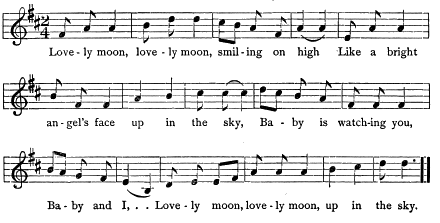
"Can the moon see the lambs?" asked the child sleepily. His eyelids were so heavy that he could scarcely keep them open, while the moon looked in at the window and his mother sang:—
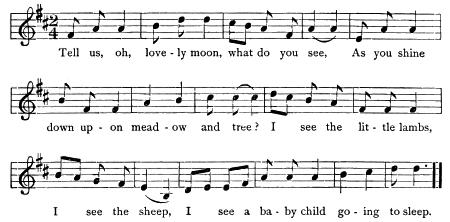
The moon smiled at the child and his mother, and the mother smiled at the moon; but the little child did not see them, for he was fast asleep.

One day the wind blew through the town, and oh, how merry it was! It whistled down the chimneys, and scampered round the corners, and sang in the tree tops. "Come and dance, come and dance, come and dance with me," that is what it seemed to say.
And what could keep from dancing to such a merry tune? The clothes danced on the clothes-line, the leaves danced on the branches of the trees, a bit of paper danced about the street, and a little boy's hat danced off of his head and down the sidewalk as fast as it could go.
It was a sailor hat with a blue ribbon around it; and the ends of the ribbons flew out behind like little blue flags.
"Stop!" cried the little boy as it blew away; but the hat could not stop. The wind whirled it and twirled it, and landed it at last right in the middle of the street.
"Now I'll get it," said the child, and he was just reaching his hand out for it when off it went again, rolling over and over like a hoop.
"Nobody can catch me," thought the hat proudly; "and I do not know myself how far I shall go."
Just then the wind whisked it into an alley, and dropped it behind a barrel there. When the little boy looked into the alley, it was nowhere to be seen.
"Where is my new sailor hat?" he cried.
"Ho! ho! I know," laughed the wind, and it blew behind the barrel, and fluttered the ends of the blue ribbon till the little boy spied them.
"Hurrah!" said he; and he ran to pick up the hat in a hurry.
"The wind shall not get my new hat again," he said; and he put it on his head and held it with both hands all the way home.
But as for the clothes on the clothes-line, and the leaves on the trees, and the bit of paper in the street, they danced on and on, till the wind blew away; and that is the end of the story.
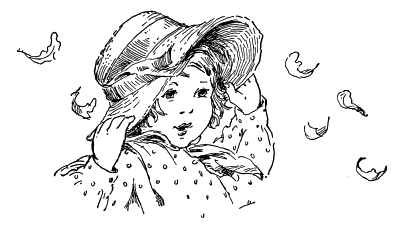
One fair spring morning two bonny brown birds sat on a lilac bush twittering and chirping:—
"Chee, chee, cheeree. Where shall we make our little nest?"
"Make it here in my branches," said the maple tree that grew by the garden gate. "Many a nest have I held in my arms. Make it here."
The maple tree was strong and green and beautiful. Its wide-spreading branches reached from the garden path far over the road beyond the gate; and they rocked like a cradle in the wind that fair spring morning. Oh! it was the very place to make a nest, and as soon as the brown birds had looked at it they decided to build there.
"Chee, chee, cheeree," they sang in the sunshine.
They twittered and chirped and trilled and sang till a cow, that was eating her breakfast of hay in the barnyard near by, put her head over the fence to ask the news. When the brown birds told her what they were going to do she did not wonder at their singing.
"If you need any hay," said she, "fly over the fence and help yourselves to some of mine. There is plenty here for you and me; and I have heard my friend the speckled hen say that there is nothing better for a nest than hay."
"Very true," said the maple tree. "Every bird must suit himself, but I agree with the speckled hen, and I have held enough nests to know something about them."
The brown birds looked at each other wisely.
"Chee, chee, cheeree," they sang again.
sang the birds as they hurried into the barnyard.
They could take only a little hay at a time in their bills, but they chose the nicest, longest pieces they could find, and were just ready to fly away with them when a horse came galloping up.
"This is no way to carry hay," he cried. "Tell me where you live, and I will bring it to your barn in a wagon."
Then the two birds laughed till they dropped the hay from their bills; the cow laughed till her bell tinkled; the maple tree laughed till its leaves shook; and the horse laughed, too, though he did not know what the joke was, till the cow told him.
"Well, well," he said to the birds, "if I cannot haul your hay for you, perhaps I may give you some hairs from my mane for your nest. I am sure I can't see what use they can be, but a bird in the pasture begged for some, and she said she was building a nest in the hedge."
chirped the birds.
By this time everybody in the barnyard knew that two brown birds were making a nest in the maple tree by the garden gate; and everybody wanted to help them.
"Take this with my love," called the pigeon; and she dropped a feather from her soft white breast, as she flew from the pigeon house.
"We, too, have feathers to spare," cried the hen and the goose.
"Every nest is the better for a bit of down," said the duck. "And I can give that."
The two birds were pleased with everything.
They were busy all the fair spring morning carrying the gifts to the maple tree; and as they flew back and forth a little girl spied them, and called to her mother:—
"Oh, mother, come and see these little birds with feathers and hay in their bills. What are they doing?"
"I know," said her mother. "They are building a nest in our maple tree. Would you like to give them a piece of cloth like your new pink dress for their nest?"
"Oh, yes, yes," said the child; and she ran and got the cloth from the scrap bag, and hung it on the lilac bush. It had not been there longer than a minute when down flew a brown bird to get it.
"Just what we needed," said the other brown bird; and she made haste to weave it into the nest, for there was no time to waste.
Over and under, in and out, twisting and pulling, they wove the cloth and the hay together, with a lining of hair and downy feathers.
The nest was finished by the time the little girl's papa came home to dinner, and he held her up in his arms to see it.
"I'm glad I gave them a piece like my new dress," she said, when she spied the bit of pink woven into the nest.
"Chee, chee, so are we," sang the brown birds in the tree top.
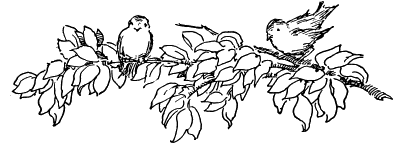
There was once a little boy who was too tired to walk; or at least he thought he was. He and his mother and the baby were at his grandmother's house and it was time to go home, but he sat down on the doorstone and felt very sure that he could not go a step farther.
"Somebody will have to carry me," he said.
"Well," said his mother, who had the baby in her arms, "what shall we do?"
And I am sure I do not know what they would have done if the little boy's grandmother had not come out just then to see what the matter was.
"If he cannot walk he must ride," she said; and she went into the house and got the old hearth broom, and the mop handle, and one of Grandfather's walking-sticks and brought them all out to the little boy.
"Now," said she, "will you ride a slow and steady gray horse, or a sleek-as-satin bay horse, or will you ride a black horse that is spirited and gay?"
"I like black horses best," said the little boy; "and I will ride that one, please."
"Very well," said Grandmother; and she took Grandfather's walking-stick and gave it to the little boy. "This is a very fast horse," she said. "I should not be surprised if you got home before your mother and the baby; but do be careful."
"I will," promised the little boy; and away he rode on the stick horse, gallop, gallop, gallop!
By the time Mother and the baby came out of Grandmother's gate the little boy was at the corner. When they reached the corner he had passed the big elm tree that grew by the sidewalk. When he rode up the little hill beyond the elm, trot, trot, trot, they almost caught up with him; but when they went down on the other side he was far ahead.
Gallop, gallop, gallop—almost before the little boy knew it himself he was at home; and when Mother and the baby got there the stick horse was hitched to the red rose bush, and the little boy sat on the doorstep laughing.
"I got home first. I got home first. I can ride fast on my black horse," said the little boy.
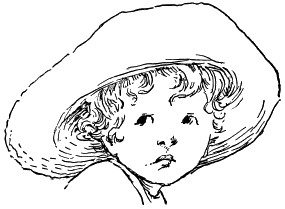
Once upon a time there was a clock that stood on the mantel in a little boy's mother's room, ticking merrily night and day, "Tickity, tickity tock." It told the little boy's father when to go to work and his mother when to get dinner, and sometimes it talked to the little boy himself. "Go to bed, Sleepy Head," that is what it seemed to say at bedtime; and in the morning it ticked out loud and clear, as if it were calling, "Wake up! wake up! wake up!"
The little boy's mother always knew just what it meant by its tickity, tickity tock, and late one afternoon, when he was playing with his toys and the clock was ticking on the mantel, she said:—
"Listen, little boy, the clock has something to tell you:—
Then the little boy jumped up in a hurry and put his hobby-horse in the corner and his pony lines on a hook in the closet and his tin soldiers in a straight row on the cupboard shelf.
"Now I'm ready," he said, but:—
"Oh!" said the little boy, when his mother told him this; but he stood very still while she washed his hands and his rosy face and combed his curls till they were smooth and shining.
"Now I'm ready," he cried, but Mother said:—
"Why, are you going to forget your nice little blouse that you've never worn yet?"
Then she made haste to get the blouse out of the dresser drawer, where it had been ever since it was finished. It had a big collar and a tie, and when the little boy put it on he looked like a sailor man.
"Now I'm ready," he said, and—do you believe it?—the very next minute the door opened and in walked the little boy's father.
"I knew you were coming," said the little boy, "and so did Mother. The clock told us and I have on my new blouse."

Once upon a time there was a saucer pie. A saucer pie is one that is baked in a saucer instead of a pan; and if you have never seen one, I hope you will before you are a hundred years old.
This pie was baked in a saucer that belonged to a little girl named Polly. Her grandmother had given her the saucer, and it was as blue as the sky.
When her mamma took the pie out of the oven, and put it on the table to cool, she said:—
The pie belonged to Polly, as well as the saucer. « 24 » Her mamma had baked it for her because it was her birthday; and she was very proud of it.
"Tell me about it again," she said, as she stood on tiptoe by the table to see it. Then her mamma said:—
But Polly did not want to eat her saucer pie by herself.
"I will have a party," she said; and away she went with dancing feet to call her neighbors in.
There was Martha, and Margaret, and little boy John; and all of them came to Polly's party.
When they got there the table was set with Polly's doll dishes, and in the middle of the table was the pie.
said Mamma, as she cut the pie, once across this way, and once across that. Each child had a slice; and then, nibble, nibble,—
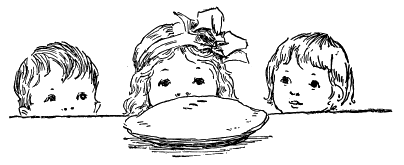
Once upon a time Polly's mamma was making biscuit for supper.
Polly watched her do everything; and when the last biscuit was in the biscuit pan, Mamma said:—
"Here is a piece of dough left on my biscuit board. I wonder if there is a little girl in this kitchen who would like to make some little biscuit?"
"Yes, yes," said Polly, clapping her hands with delight, for, of course, she knew her mamma meant her. "I'd like to make little biscuit all by myself."
So Mamma tied one of her big aprons around Polly's neck, and Polly rolled up her sleeves just as Mamma did when she cooked. Then she was ready to begin her biscuit.
"May I sift flour, too?" she asked.
"Yes, indeed," said Mamma. "You must always sift flour on your board if you want your biscuit to be smooth and nice."
What do you think? Mamma's biscuit cutter was larger than Polly's piece of dough!
"I think you will have to borrow Grandmother's thimble for a biscuit cutter," said Mamma. A thimble biscuit cutter! Was there ever anything so funny as that? Polly laughed about it all the way upstairs to Grandmother's room; but when she told Grandmother « 28 » what she wanted, Grandmother did not think it was strange at all.
"I used to make thimble biscuit when I was a little girl," she said; and she made haste to get the thimble out of her workbag for Polly.
Grandmother's thimble was made of shining gold; and oh, what a fine biscuit cutter it made! The biscuit were as small and as round as buttons, and Polly cut enough for Grandmother, and Papa, and Mamma, and Brother Ned, and herself, each to have one for supper that night.
"I think it is fun to make thimble biscuit," she said as she handed them around in her own blue saucer; and if you don't believe she was right, make some yourself, and see.

Once upon a time two little birds built a wee little nest in a pink rose tree.
The nest was round and cozy and soft; and when it was finished the mother-bird put eggs in it—the prettiest eggs!
The mother-bird sat on the nest almost all the time to keep the eggs safe and warm; and when she was tired the father-bird took her place.
Day after day the mother-bird sat on the nest; but one morning she flew away singing her sweetest song. The father-bird sang, too, for something wonderful had happened. The pretty blue eggs were broken, but in their place were—what do you think? Baby birds, cunning and weak and wee.
The father bird and the mother bird were busy all day getting their babies something to eat.
The little birds grew very fast. It was not long before they were ready to learn to fly. Mother bird and father bird showed them how to spread their wings, and hold their feet; and the little birds tried to do just as they were told.
At first they could only fly from the rose tree to the ground; but soon their wings grew strong, and then away they went over the rose tree, over the fence, into the world.
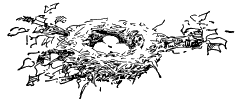
Once upon a time there was a strawberry shortcake, all juicy and sweet and pleasant to eat.
A little boy named Ben picked the berries for it. He went out to the field where the wild strawberries grew, all by himself; and when he came home he had a bucket full of the very ripest and reddest ones.
A little girl, Cousin Pen, who was visiting on the farm, capped the berries, and that was not nearly so easy to do as it sounds. It took Cousin Pen every bit of a half-hour to do it, and—do you believe it?—she did not eat a single berry. She saved every one of them for the strawberry shortcake.
Mamma made the shortcake. She was the best cook! If I should try to tell you all the good things she could make, it would take me longer than it took Cousin Pen to cap the berries; but I will tell you this, if there was one thing she liked to make better than another it was a strawberry shortcake.
A big boy almost nine years old, whom every one called Brother Fred, cut the wood, and split the kindling, and made the fire that baked the pastry for the strawberry shortcake. He had a little axe of his own, and the way he could make chips fly was simply astonishing. Mamma said if he kept on as he had begun he would be as much help as his papa when he grew up.
Papa was away at work when the shortcake was made, and when he came home to dinner nobody said a word about it. They did not even tell him there was a dessert. They just sat down and ate their dinner as if there were not a strawberry shortcake in the world, much less one in their own kitchen. It was the funniest thing! Papa did not know anything about it; but by and by he said:—
"Wild strawberries are ripe. Who wants to go and get some for a shortcake?"
And then how the children did laugh! They laughed and laughed until Mamma knew they could not keep the secret another minute.
"Shut your eyes, Papa, and don't open them until we call 'ready,'" she said, and she slipped out into the kitchen and got the strawberry shortcake, and put it on the table right in front of him.
"Ready," called Cousin Pen and Brother Fred and little Ben. "Ready."
And if you could have seen how surprised Papa was when he opened his eyes and spied that strawberry shortcake, you would have laughed as much as they did.

One morning little boy Ben came home from the pasture, where he had taken the cows, with so much to tell that he could not wait until he got to the house to begin.
"The wild grapes are ripe, the persimmons are sweet, and the chestnuts are falling out of the burrs. One dropped on my hat when I came through the wood; and I saw a little gray squirrel eating nuts," he called to Brother Fred as soon as he reached the big gate.
"Hurrah!" said Brother Fred. "We can go and get some this very afternoon;" and when he went to take some corn to the mill for his father, he stopped at his Cousin Pen's house to tell her about it.
"The wild grapes are ripe, the persimmons are sweet, and the chestnuts are falling out of the burrs. « 36 » We are going to get some this afternoon. Don't you want to go, too?" he asked.
"Yes, indeed," said Cousin Pen; "and I will bring Mary Sue with me."
Mary Sue was Cousin Pen's little friend; and as soon as Brother Fred had gone, Cousin Pen ran over to her house.
"Oh, Mary Sue!" she cried. "What do you think? The wild grapes are ripe, the persimmons are sweet, the chestnuts are falling out of the burrs, and my Cousin Fred wants us to go to the woods to get some this very day."
"How nice," said Mary Sue; "let's go and tell Dan."
Dan was Mary Sue's neighbor. He lived next door to her; and he let Cousin Pen and her ride on his pony sometimes. He was in the barn feeding the pony when the girls went to his house; and they ran through the yard to find him.
"The wild grapes are ripe, and the persimmons are sweet—" cried Cousin Pen.
"And the chestnuts are falling out of the burrs. Don't you want to go and get some?" asked Mary Sue.
"I'll go if Larry Brown will," said Dan; and he climbed up on a ladder and put his head out of the barn window, and called as loud as he could:—
"Larry, Larry, don't you want to go to the woods to get some grapes and persimmons and chestnuts? I'll go if you will."
Larry came running across the street from his house in a hurry to see what was the matter. He was as pleased as all the rest had been to hear the good news; and when he went home he told his little sister Nan about it.
"The wild grapes are ripe, the persimmons are sweet, the chestnuts are falling out of the burrs, and I am going to bring you some," he said.
But little Nan wanted to go, too. "I will carry her if she gets tired," said Larry; so after they had eaten their dinner, Mother gave Nan a little basket, and she started out, holding Larry's hand.
The others were ready and waiting; and away they all went to the pleasant wood.
Oh, what a good time they had! The grapes were ripe, the persimmons were sweet as sugar, the chestnuts dropped from the open burrs, and up in a tree, where they all might see, sat the little gray squirrel!

Once upon a time a little boy named Ted was very hungry.
She had bought the roll that very morning from the busy baker who kept a shop at the corner.
The baker got the flour from the merry miller whose mill stood by the river side.
The flour was made from the yellow wheat that a friendly farmer brought to the mill.
The wheat grew in the fields that the farmer had plowed.
Ted sat down on the kitchen doorstep to eat the roll.
Note.—The little child's "Thank you, Mother," is the beginning of the universal gratitude which will come to him as we gradually lead him to see the interdependence of all life, and the wonderful goodness of God.
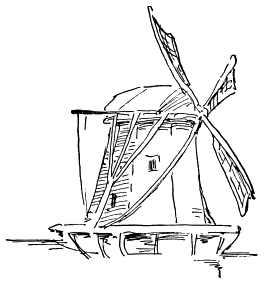
Once upon a time there was a grandmother who went to spend Thanksgiving day with her children and grandchildren.
She had three grandchildren, Isabel, Jack, and Jamie, and as soon as she had taken off her cloak and bonnet she sat down in Mamma's big rocking-chair, and called them to her.
"I have a present for each one of you in my brown bag," she said, "but before I give them to you, you must guess what they are."
"Oh, Grandma!" said Isabel and Jack and Jamie; and they watched her with wondering eyes as she opened the bag, and took out a bundle.
"Jamie's present is in this bundle," said she. "It is red on the outside, and white on the inside and in the middle there is something brown."
"I believe I know what it is," said Jack.
"So do I," said Isabel; but Grandma would not let them guess.
"Jamie must guess it himself," she said. So Jamie guessed a ball, and a flower and a piece of candy and everything else he could think of; but he could not guess what was in the bundle till Grandma let him smell it. Then he knew.
"An apple, a red apple," he cried; and when he opened the bundle, there, sure enough, was a big, round apple. It was red on the outside, and white on the inside; and when he had eaten it he found in the middle, one, two, three, four, five, six, seven brown seeds.
The next bundle was for Jack. Grandma shook it up and down, and something rattled inside.
"Marbles," guessed Jack; but Grandma shook her head.
"Listen to this," she said:—
"Nuts, nuts!" cried Jack. "Hickory nuts from the big hickory tree that grows in your front yard." And he was right, too.
"Now it is my turn," said Isabel; "and I am going to try to guess my present with my very first guess."
But when Grandma took out a little bundle wrapped in tissue paper, and put it into Isabel's hands, she was as puzzled as the others had been.
"Be very careful," said Grandma; "for if you break your present you will never be able to mend it, no matter how hard you try."
"May I ask questions about it?" asked Isabel.
"Yes," said Grandma, "you may ask three questions; but when I have answered those I will close my lips, and will not answer another one."
Then Isabel asked the three questions:—
"What color is my present?"
"White," said Grandma.
"Where did it come from?"
"The haystack," said Grandma.
"Who told you it was there?"
"The old white hen," said Grandma; and she closed her lips just as she had said she would; but Isabel knew what her present was without another word.
"I knew as soon as you said it came from the haystack," she said. "It is an egg."
And so it was, a beautiful fresh white egg. Isabel had it for her breakfast the very next morning.
"My!" said Grandma, as the children gathered around her to kiss her and thank her. "What good guessers my grandchildren are!"

Once upon a time when all the ground was white with snow and all the roofs were trimmed with icicles, a little boy went out into the world to make snowballs.
His mother wrapped him up so nice and warm from head to toe that you could scarcely see anything of him but the tip of his nose; and when the snowbirds that lived in his own front yard saw him, they did not know him.
They flew away to the top of the fence, and cocked their heads first on one side, and then on the other, as if they were thinking, "Who can this be?" but by and by they found out.
"Chirp, chirp," they said to each other. "It is only the little boy who throws us crumbs from the « 48 » window;" and they flew down into the yard again to watch him make snowballs.
The little boy knew just how to make snowballs, and how to throw them, too, for he had seen his big cousin do it. First he took a handful of snow, and then he packed it in his hands like this; and then hurrah! he threw it as far as he could send it.
One of his snowballs went into the corner of the yard and one against a tree, and one all the way over the fence into the street. It was great fun to play in the snow, and the little boy was sorry when the maid called from the house to tell him it was time to come in.
"As soon as I make one more," he answered; and he took a great handful of snow, and made such a big snowball that he thought he must take it into the house to show to his mother.
Now the little boy's mother had gone to market while he was playing in the snow; but he took the snowball into her room, and put it on the hearth so that she might see it when she came home.
There was a bright fire burning in the grate, and it sounded just as if it were laughing, with its cricklety cracklety, cricklety cracklety, when the little boy put the snowball down in front of it.
"Oh! what a nice big fire," he said; and he climbed up into the rocking chair close beside it to wait for his mother.
"Rockity rock, rockity rock," said the rocking chair.
"Cricklety, cracklety," laughed the fire; and the little boy was so comfortable and so warm that he went fast asleep on the cushions.
When he waked up his mother was still away at the market; and the fire was still laughing, louder than ever.
"Cricklety cracklety, cricklety cracklety;" but when he looked on the hearth for his snowball it was « 50 » gone! There was nothing there at all but a little pool of water.
The little boy looked under the chair and under the bed and under the dresser, behind the door and in all the corners; upstairs and downstairs, high and low; but he could not find the snowball anywhere.
And what do you think had become of it? The little boy's mother guessed as soon as she came home; and if you will ask your mother I am sure she will tell you.
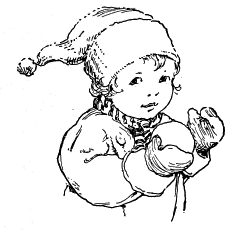
A WONDER STORY FOR LITTLE CHILDREN
"Wonder is the basis of worship."—Carlyle.
Every year, on the night before Christmas, Santa Claus comes.
He rides in a sleigh drawn by tiny reindeer with bells on their harnesses.
Tinkle, tinkle, ring the bells, and trit-trot, go the little deer to carry Santa Claus over the world.
Santa Claus dresses in fur from his head to his heels. His leggings are fur, his coat is fur, and he wears a fur cap pulled down over his ears, for the winds of the winter are icy cold.
O-o-o-o, sing the winds, tink, tinkle, ring the bells, and trit-trot, go the little deer when Santa Claus rides over the world.
Santa Claus's beard is as white as the snow, and his cheeks are as red as apples, and his eyes are as bright as the twinkling stars that look from the sky to see him ride.
Twinkle, twinkle, shine the stars, O-o-o-o, sing the winds, tink, tinkle, ring the bells, and trit-trot, go the little deer when Santa Claus rides over the world.
Santa Claus is old, old as the hills, but he is strong as a giant, and on his back he carries a pack, and the pack is full of toys. He has dolls and drums, and balls and tops, wagons and sleds, tea sets with blue roses painted on them, and horns with red and white stripes; and all of them are for little children. As soon as the children are asleep on Christmas Eve, Santa Claus comes to fill their stockings with good things and give them beautiful gifts. He knows just what the children want, every one of them, and he laughs for joy as he rides away.
Ha! ha! laughs Santa Claus, twinkle, twinkle, shine the stars, O-o-o-o, sing the winds, tink, tinkle, ring the bells, and trit-trot, go the little deer when Santa Claus rides over the world.
The children never see him come. No, indeed! If he hears so much as a laugh or a whisper in the house he stays outside till all is quiet. Why, once upon a time there was a little boy who did not want to go to bed on the night before Christmas. "I shall sit up and see Santa Claus," he said. He hung his stocking by the mantel, and sat in his mother's big rocking chair and waited, and watched, and waited; but all that he saw was a little gray mouse, though he stayed awake till everybody but his mother was in bed, and he could not keep his eyes open another minute. The last thing he saw as he went to sleep was the stocking hanging just where he had put it, and there was nothing in it; but—do you believe it?—when he waked up next morning it was full of goodies from tip to toe; and right in front of the hearth was a wagon with red « 54 » wheels! "Oh, oh! Santa Claus has been here," said the little boy; and he clapped his hands, for he was happy as could be.
All the world is happy when Santa Claus comes. Trit-trot, go the little deer, tink, tinkle, ring the bells, O-o-o-o, sing the winds, twinkle, twinkle, shine the stars, and ha! ha! laughs Santa Claus, as he rides over the world to fill the children's stockings, and to bring beautiful gifts.
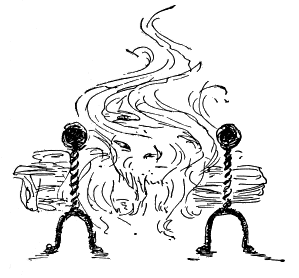
Once upon a time there was a little boy who went to buy some nails for his father, and while he was waiting for the storekeeper to wrap them up, he saw in the window a little red hatchet.
"If I had a little red hatchet," thought the little boy, "I could pound nails and split boards, and perhaps I could build myself a little house," and he asked the storekeeper the price of the hatchet.
"Just as many pennies as you have fingers on your hands, or toes on your feet," said the man.
"Oh!" said the little boy, and as soon as he went out of the store he counted his fingers. "One, two, three, four, five, six, seven, eight, nine, ten." He could not count his toes then, for he had on his shoes and stockings, but he remembered to do it when he « 56 » undressed that night; and he had just as many toes as he had fingers. The little red hatchet cost ten pennies. "If I had ten pennies," he said to his mother, "I know what I should do. I should buy me a little red hatchet."
"How nice that would be," said his mother; "and where would you get it?"
"From the storekeeper," said he; "and I could pound nails and split boards and build houses. I wish I had one."
"So do I," said his mother; "but now you must go to sleep, for to-morrow is your birthday, and you will want to be up with the sun."
The sun was up before the little boy, though, and so was his mother. She was sitting on the bed when he waked up, and on the table, close by the bed, were—what do you think? Ten pennies, all in a row.
"Now you can buy the little red hatchet," said his mother, giving him a birthday kiss.
"Yes, now I can buy the little red hatchet," said the little boy; and he could scarcely wait to dress and eat his breakfast before he started out to the store. The ten pennies were in his pocket and they jingled merrily as the little boy ran down the road. "Ten of us are here! Ten of us are here!"—this is what they seemed to say, and the boy laughed to hear them.
"Perhaps I'll cut down a tree with my little red hatchet," he thought, as he ran.
It was early in the morning when he reached the town, but the stores were open, and the men who sold things on the street were already calling their wares. One was a ragman. "Rags, rags!" he called. Another was a pieman. He had his good things in a cart that he pushed before him. There were fresh raspberry tarts in his cart that day, and every now and then he called:—
"Tarts, tarts, raspberry tarts! A tart for a penny and a penny for a tart. Tarts, tarts, raspberry tarts! « 58 » A tart for a penny and a penny for a tart!" The little boy stopped to listen. "Tarts, tarts, raspberry tarts!" Oh, how delicious they looked—those penny tarts in the pieman's cart!
"Will you have a tart, little master?" asked the pieman.
The little boy put his hand in his pocket and drew it out; then he put it back and drew it out again. This time a penny came with it. "Yes, if you please," he said to the pieman. "I want a raspberry tart." A nice, sweet, juicy three-cornered raspberry tart! The little boy had eaten every crumb of it when he came to the store where the little red hatchet lay in the window.
As soon as he saw the hatchet he put his hand into his pocket again and jingled his pennies. "One of us is gone! One of us is gone!" said the pennies as plainly as they could; but the little boy sat down on the edge of the sidewalk and counted them. "One, « 59 » two, three, four, five, six, seven, eight, nine." Then he went into the store. The man who had told him the price of the hatchet was not there, but a clerk came to wait on him.
"Are there any nine-penny hatchets?" asked the little boy.
"No," said the clerk; "all the little hatchets are ten cents, and cheap at that. Would you like one to-day?" But the little boy shook his head and went out of the store. The pennies did not jingle in his pocket, and his eyes were full of tears. He was just getting his handkerchief out to wipe them away when he met an old woman.
"Why are you crying, little boy?" asked she; and her voice was so kind and her smile so pleasant that the little boy told her all about it.
"Dear me," said she, when he had finished; "I should not be surprised if you were the little boy for whom I am looking."
"Were you looking for a little boy six years old?" asked the child.
"Oh, yes, indeed," said the old woman; "and I want him to pick up a pennyworth of chips for me."
When the little boy heard this he knew that he must be the boy she wanted.
"I am six years old to-day," he said, "and I can pick up chips. I pick them up for my mother, and when I get my little red hatchet I am going to split kindling for her, too."
Then the old woman led the way to her house and gave the little boy a basket and showed him where the woodpile was. The wood chopper had been there with his sharp axe, and the chips were strewn about the yard. The little boy set to work with a will, and when he had filled the basket so full that not another chip would stay in, he took it to the old woman.
"Is this a pennyworth of chips?" he asked.
"Yes, and good measure," answered the old « 61 » woman, and she took a bright new penny out of her bag and gave it to the little boy. "Good-by, and good fortune," she said; and the little boy wished her the same before he ran through the gate toward the town.
Oh, how swiftly his feet pattered down the road, and, oh, how merrily the pennies jingled in his pocket! "Ten of us again! Ten of us again!" This is what they seemed to say now, and the little boy laughed to hear them as he ran past the ragman with his bag, past the pieman with his tarts, straight to the store where the little red hatchet still lay in the window.
"If you please, I want a little red hatchet," he said; and he counted his pennies out on the counter, ten of them in a row.
"Just as many pennies as you have fingers on your hands, or toes on your feet," said the man, who had come in to the store again; and he wrapped the little « 62 » red hatchet in a piece of brown paper and gave it to the child.
It was a good little hatchet, and the little boy pounded nails and split boards and cut his mother's kindling with it; but whether he ever built a house or cut down a tree I cannot tell you, for I do not know myself.

There was once upon a time a little girl who had a china doll named Jennie Bluebell. Jennie Bluebell had black hair, and blue eyes, and rosy cheeks, and a smiling mouth; and on her feet were painted gilt slippers that shone like gold.
The little girl loved her more than she had ever loved any other doll and wherever she went she wanted Jennie Bluebell to go too. She took her to walk in the lane, and to ride in the carriage, and one day she carried her to a meadow where she and her little brother went to pick golden-rod. She held her in her arms all the way just as Mother held the baby and when she got to the meadow she laid her down to rest in the long meadow grass while she picked the flowers. Meadow grass makes a beautiful soft bed for a doll.
"I will come back for you by and by," she said as she left her there; but when it was time to go home all the green grass looked alike to the little girl and she could not tell where the dear doll lay.
"I put her right here, or at least I think I did. Oh, where can she be?" she cried, as she hurried from place to place parting the grasses with her hands and peeping anxiously in. Her little brother searched, too, but though they both looked till their mother called to ask why they were staying so long, they had to go home at last without the doll.
"Perhaps the fairies have taken her away," said the little girl, who was almost crying.
"Or a rabbit," said the little boy; "Father saw one in the field yesterday."
But neither fairies nor rabbits had touched Jennie Bluebell. The tall grasses had swayed in the breezes this way and that way till she was hidden from sight but she had not moved from the spot where the little girl had put her. All through the sunny afternoon she lay there hoping that some one would find her, and when it began to grow dark and nobody had come she felt very lonely indeed.
"I shall not close my eyes all night," she said; and she did not. When the rooster over in the barnyard crowed for morning, her eyes were as wide open as they had been when the first star shone the evening before.
Almost as soon as it was light again she heard a noise in the meadow. Swish, swash! Swish, swash! it sounded. The children's father was cutting his grass with a sharp-bladed scythe, but the doll did not know this and when the grass around her fell down in a heap upon her she thought that the end of everything had come.
"What in the world has happened?" she asked a grasshopper who had been caught in the fall.
"That is just what I should like to know myself," « 66 » he answered; and he struggled up to the sunshine and never came back.
The children did not come to look again for the doll that day, or the next, and she gave up all hope of being found.
"They have gone to visit their grandparents," she said. "I heard them talking about it. They have forgotten me, and I shall never see them again."
That very afternoon, however, they came to the meadow to help their father rake the grass, which the sun by that time had dried into sweet-smelling hay. They had been on a visit, sure enough, and as they worked they talked of the things they had done while they were away from home. The doll could hear every word they said.
"I rode Grandpa's horse to water two times by myself," said the little boy.
"I fed Grandma's chickens every day with corn," said the little girl.
"Grandpa plants corn in his fields," said the little boy. "You don't have to rake corn."
"I like to rake hay," said the little girl; "and Mamma says that I may find Jennie Bluebell when the field is cleared."
Oh! how the china doll's heart leaped for joy when she heard that; and—do you believe it?—the very next minute the hay that covered her was raked aside and there she lay right before the little girl's eyes!
"Oh, oh, oh!" the little girl cried; "here she is, my precious doll. I was never so glad in all my life."
And Jennie Bluebell was glad too, though she did not say a word. She only smiled.
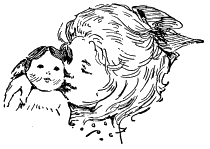
Once upon a time there were two dogs who were great friends. One of them was small and one was large, and they were called Little Dog and Big Dog all the days of their lives, and had no other names.
Little Dog barked at everything he saw. He barked at the cat and he barked at the kittens; he barked at the cow and he barked at the calf; he barked at his own shadow; and he even barked at the moon in the sky with a "Bow-wow-wow!" and a "Bow-wow-wow!"
Big Dog had a very loud bark, "Bow-wow! Bow-wow!" but he barked only when he had something to say. And everybody listened to him.
Now one day as the two dogs sat together in the sunshine, Big Dog said to Little Dog:—
"Come, let us go to see our friend, the king."
Little Dog thought this was a splendid plan, and they started at once.
Big Dog walked along the road with his tail curled over his back, and his head held high. "There is no need of haste," he said, but Little Dog thought there must be.
"I shall get there first," he called, as he scampered ahead, but presently he came back as fast as he had gone.
"Oh, Big Dog, Big Dog," he said, "we cannot go to see the king."
"Why not?" asked Big Dog. "Has he gone away from home?"
"I know nothing about that," answered Little Dog, who was almost out of breath, "but a little farther on there is a great river, and we can never get across."
But Big Dog would not turn back. "I must see this great river," he said, and he walked on as quietly « 70 » as before. Little Dog followed him, and when they came to the river Big Dog jumped in, splish! splash! and began to swim.
"Wait, wait," cried Little Dog, but Big Dog only answered, "Don't be afraid."
So in jumped Little Dog, splish! splash! too, for he did not want to be left behind. He was terribly frightened, but he paddled himself along with his four feet just as he saw Big Dog doing, and when he was safe across the river, which was not half so wide as he had thought, he barked at it as if he had never been afraid at all.
"Bow-wow-wow-wow! You cannot keep us from the king," he said, and he was off and away before Big Dog had shaken the water from his coat. But in less time than it takes to tell it, Big Dog spied him running back with his tail hanging down and his ears drooping.
"Oh, Big Dog, Big Dog!" he cried. "We cannot « 71 » go to see the king, for in the wood yonder there is a bear, and she will eat us both for her supper. I heard her say so myself."
Then Big Dog made haste to the wood, barking loudly:—
"Bow-wow! Bow-wow! I am not afraid! I am not afraid!" and when the bear heard him she ran to her home as fast as she could.
"I can eat honey for my supper," she said; and the two dogs saw no more of her.
Now by this time Little Dog had run so fast and barked so much that he was tired. "I do not want to go to see the king," he said; and he lay down in the road and put his head between his two front paws.
But Big Dog said, "I smell a bone," and Little Dog jumped up in a hurry again. Sniff! sniff!—where could it be? The two dogs put their noses close to the ground and followed the scent till they came to the turn of the road; and there sat a charcoal « 72 » burner eating his supper of bread and mutton chops by his fire.
Little Dog wanted to run up and beg for something, but Big Dog would not go with him. "It is more polite to wait," he said; and he sat down on the other side of the road. Little Dog sat down beside him, and they waited and waited; but at last the man finished his chops and threw the bones to the dogs, which was just what Big Dog had hoped he would do. Oh, how good they tasted!
"Where shall we sleep to-night?" asked Little Dog, when he had eaten his share.
"Oh, never fear," answered Big Dog, "we will find a place;" and when they had gone on their way they very soon came to a house in the wood. The door was open, and Big Dog put his head inside to see if anybody was at home. Nobody lived there, however, but a barn swallow, so the dogs went in and lay down to rest on some hay in the corner.
"We must be off early," said Big Dog; but when they woke up next morning the door was fastened tight; for the wind had blown by in the night and slammed it into its place. When Big Dog saw this he was in great distress.
"Oh, Little Dog! Little Dog!" he cried. "I fear we can never go to see the king, for the door is closed, and there is no one to open it."
"But we can go through the hole under the door," answered Little Dog; and when Big Dog looked, there, sure enough, at the bottom of the door, where a board had rotted away, was a hole just large enough for a little dog to creep through. Little Dog put his nose through and his head through, and then wriggle, wriggle, he was out and barking merrily.
"Come on, Big Dog," he called; but Big Dog could not go. He could not even get his head through the hole.
"You must go on alone," he said to Little Dog, « 74 » "and when you have come to the king's palace, and have told him about me, perhaps he will send me aid."
But Little Dog did not wait until he reached the king's palace to ask for help. "Bow-wow-wow-wow! Listen to me," he barked, as he ran down the road. "Big Dog, my friend, is shut up in the house in the wood, and cannot go to see the king. Bow-wow-wow-wow!"
At first there were only birds to hear him, but presently he saw a woodcutter with an axe on his shoulder.
"Bow-wow-wow-wow! Listen to me," barked Little Dog. "Big Dog, my friend, is shut up in the house in the wood and cannot go to see the king. Bow-wow-wow-wow!" But the woodcutter did not understand a word he said.
"Whew! whew!" he whistled, which meant, "Come, little doggie, follow me;" but Little Dog had no time to play.
He hurried on as fast as he could, and by and by he met the woodcutter's wife going to town with a basket of eggs on her arm. "Bow-wow-wow-wow! Listen to me. Big Dog, my friend, is shut up in the house in the wood, and cannot go to see the king," barked Little Dog. But the woodcutter's wife did not understand a word he said.
"You noisy little dog," she cried. "You have startled me so that it is a wonder every egg in my basket is not broken," and she shook her skirts to get rid of him.
"Nobody will listen to me," thought Little Dog, as he scampered on, but just then he spied a little boy with a bundle of sticks on his back. He was the woodcutter's little boy; and—do you believe it?—he understood every word that Little Dog said, and followed him to the house.
When they drew near they heard Big Dog calling for help:—
"Bow-wow! Bow-wow! Come and let me out. Come and let me out."
"Bow-wow! we are coming," answered Little Dog.
"We are coming," said the woodcutter's little boy; and the very next minute Big Dog was free.
The king's palace was not far from the wood, and the two dogs were soon at their journey's end. The king was so pleased to see them that he made a great feast for them, and invited the woodcutter's little boy because he was their friend.
After the feast Big Dog and Little Dog were sent home in the king's own carriage; and all the rest of their lives they were even better friends than before they went traveling together.

One morning when the little king waked up, all of his pet rabbits were gone, and nobody, not even the owl who had been awake all night, knew anything about them. They were white rabbits with pink eyes and pink ears, and you can just imagine how the little king felt when he heard they were lost.
"Find my white rabbits and I will give you whatever you ask of me, even though it should be the crown from my head," he said to everybody who came to see him; and, of course, everybody started out at once to look for the rabbits.
The princes and princesses, the dukes and the duchesses, the counts and the countesses, and all the other fine ladies and gentlemen of the king's court went in carriages to the city to look for the rabbits, and presently « 78 » they came back in great glee. They had not found the rabbits, but they had bought some made of candy at a confectioner's shop, and they were very much pleased with themselves.
"These are so cunning and sweet—much sweeter than real rabbits," they said, but the little king did not think so.
"They are fit for nothing but to be eaten," he said, and he had them carried away to the pantry.
The little king's soldiers felt very certain that the king in the next country had taken away the rabbits, so they marched over the hill to bring them back, beating their drums with a bum, bum, bum. Their uniforms were as red as a cock's comb, and they were as brave as lions, but they had to come home without the white rabbits. The king of the next country had never so much as seen the tips of their ears.
"King indeed," said the hunters. "The foxes have carried the rabbits away to their dens, and we will go « 79 » and bring them back or know the reason why," and they hastened to the woods with their guns. Bang, bang—they, too, made a great noise, but it did no good. The king's rabbits were nowhere to be found.
The servants all went to the park. "If the rabbits are anywhere they are here," they said, and they told the park policeman about them.
"White rabbits with pink eyes and pink ears are not allowed in the park," he said indignantly, so the servants had to go home without the rabbits, as all the rest had done.
The king's gardener went to his garden in a hurry. "I'll not have a leaf left," he said to himself. But when he got to the garden every leaf was in place. The pink roses were just opening their buds in the sunshine, and the white pinks were nodding in the breezes, but not a sign of the white rabbits with pink eyes and pink ears did the gardener see.
The gardener's little daughter Peggy went to the rabbit hutch first of all. She knew that the rabbits were not there, of course, but she had to begin her search somewhere. Nobody, not even the little king himself, loved the white rabbits more than Peggy did. She knew their names, and how old they were, and what they liked best to eat. Every morning as soon as she had eaten her own breakfast she came up from the little cottage where she lived with her mother and father, to bring them lettuce and cabbage leaves. It made her very sad to see the empty hutch, and two bright tears shone in her eyes.
Before they had time to roll down her cheeks Peggy saw something that surprised her very much. It was a hole in the corner of the fence that was built around the rabbit hutch. As soon as she saw it she dried her eyes, and ran through the gate into the road behind the barnyard. The rabbits were not there, but in the dust that lay thick and white along the road were ever so many queer little marks that looked like the prints of rabbit feet.
"Oh, so this is the way they went," said Peggy, and she followed the tracks as long as she could see them.
By and by she came to a cool green lane that led from one side of the road. That was the very place for rabbits, Peggy thought.
"Bunny, bunny, bunny," she called as she peeped in. Not a rabbit or a rabbit track was to be seen, however, and Peggy was hurrying away when she spied by the path a bunch of green clover all tattered and torn, just as if—just as if—
"Rabbit teeth have been nibbling these leaves," cried Peggy joyfully, and she hastened down the lane expecting to see the rabbits at every turn. But she did not find them, though she looked behind every tree, and into every nook and corner from one end of the lane to the other.
There were two roads at the other end of the lane. One led over the hill to the next country. There were many footprints upon it, but they were only the ones the soldiers had left when they marched away to find the white rabbits. The other road ran by the woods where the hunters had hurried. Grass grew upon it, and flowers nodded over it, but there was not a single nibbled leaf to show that the rabbits had been there.
"Dear me, which way shall I go?" said Peggy; but she had scarcely spoken when a breeze blew by. It had been blowing over somebody's garden. Peggy knew that as soon as it passed.
"I smell cabbages," she cried, and away she ran by the woods, and through the flowers, till she came to an old woman's cabbage patch. And there, eating cabbage leaves to their hearts' content, sat the little king's rabbits! Peggy ran home as fast as she had come; and great was the rejoicing in the king's palace when she had told her news.
"I will give you whatever you ask, even should it be the crown from my head," the little king said to her; and all the fine ladies and gentlemen crowded around to hear what she would say.
"A carriage and horses," whispered one.
"A bag of gold," said another.
"A house and land," cried a third, for they all wanted to help her choose.
But Peggy knew what she wanted without anybody's help.
"If you please, your majesty," she said, making the king a curtsey, "I should like a white rabbit for my own."
And—do you believe it?—the little king gave her two!
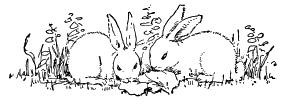
Once upon a time there was a man who was made of snow. He had sticks for his arms, and coals for his eyes; his nose was made of an icicle, and his mouth was a bit of bent twig, which turned up at the ends, so he looked as if he were smiling.
"He's the finest snowman we've ever seen," said the children who made him; and they joined hands and danced around him till their mother called them in to supper.
"Good-by," they called to him as they climbed the fence that divided the field from the yard. "Good-by. We will bring you a hat to-morrow."
There were a half dozen of the children, and the youngest of them was a little boy who had never helped to make a snowman before. He thought of « 85 » this one all the time he was eating his supper, and even after he had gone to bed that night. He knew just how the snowman looked with his smiling mouth and stick arms.
"I wish we had taken him a hat to-night," he thought, as his eyelids dropped down like two little curtains over his eyes.
"Archoo! archoo! I wish that you had," said something outside the window; and—do you believe it?—it was the snowman sneezing as hard as he could!
"This is what comes of standing out in the cold bareheaded," he said. "I shall sneeze my head off—I know I shall. Archoo! archoo! archoo!"
"Dear me!" said the little boy. "I will get you a hat but it will have to be my sailor, for I wear my new hat to church and to parties, and my everyday cap will not fit you, I am afraid,—we made your head so large."
"The sailor will do nicely," said the snowman, "if I may have it at once. As it is, I am catching my death of cold. Archoo! archoo! archoo!"
When the little boy heard this, he jumped out of bed and ran to the cupboard and got the sailor hat from the top shelf and gave it to the snowman.
"How do I look in it?" he asked as soon as he had put it on.
"Well enough," answered the moon, who had been watching all the while; "but you will have to make haste if you want to go anywhere before daylight."
"Don't you hear what the moon is saying?" said the snowman to the little boy. "What are you waiting for?"
"Am I going anywhere?" asked the child.
"Of course," answered the snowman. "Why shouldn't you go?"
The little boy could not think of an answer to this; and the next thing he knew he was out of the window with the snowman.
"Where are we going?" asked he.
"Why," said the snowman hurrying away into the street, "I have never thought of that, but since you speak of it I think we had better go to the Winter King's palace, and ask him if he cannot do something to keep the sun from shining to-morrow."
"Oh!" said the little boy, for his mother had promised that he might go to his grandmother's if the day was fine. He had no time to say anything about this, however, for just then the snowman cried out:—
"I have dropped one of my eyes, and I cannot go on without it."
"Dear me, dear me!" said the little boy. "How shall we ever find it?"
But while he was talking, a little dog that he knew very well came by. His name was Fido, and he could find anything that was lost. He had found the little « 88 » ball when it rolled under the house, and his master's overshoes when everybody else had failed; and when he heard of the lost eye he started back at once to look for it.
"Don't worry," said the little boy, "Fido will find it;" and sure enough, in the twinkle of a star he was back with the coal in his mouth! The little boy put it in its place as quickly as he could, for the snowman seemed to be in a hurry.
"Didn't you see that we were at a baker's shop?" he said. "I know I must have been near the oven, too, for one of my ears is almost melted off."
"Why, you haven't any ears!" said the little boy. "We did not know how to make them."
"No ears?" cried the snowman. "Then how do I hear what you say? But there now, you are only a little boy, and cannot know everything. Besides, here we are at the palace, and you must be quiet."
The little boy had thought he was passing the « 89 » schoolhouse where his big brothers and sisters went to school, but when he went inside he saw that he was wrong, and the snowman was right, for in the place where the teacher's desk should have been, was a throne; and on the throne sat the Winter King with icicles in his beard.
As soon as he saw the snowman and the little boy, he began to talk very fast:—
"What has this little boy been doing? Why isn't he in bed? Come here, Jack Frost, and tickle his toes."
"Oh! no, no," cried the snowman. "He has done nothing wrong. He is one of my best friends, and I have brought him here with me to ask you not to let the sun shine to-morrow. I don't want to melt."
"Ah! hum! ha!" said the king. "I don't know about that. You will have to melt sometime, won't you?"
"Of course," said the snowman; "but I'd like to last as long as I can." It made the little boy very sad to hear him talk in this way. He thought he would rather not go to his grandmother's than to risk the snowman in the sun.
"We are very fond of him," he said to the king. "He's the finest snowman we've ever seen, and he looks just as if he were smiling."
"So he does," said the king, looking at the snowman again; "and since you ask it I'll tell you what I will do. I cannot keep the sun from shining, but I will ask the North Wind to freeze the snowman, and perhaps he will last anyhow."
When the snowman heard this he began to dance, and as the little boy had hold of one of his stick arms he had to dance too. Together they danced out of the Winter King's palace, down the streets, into the field, where they found the North Wind waiting for them.
The first thing he did was to blow the hat from the snowman's head.
"Archoo! archoo!" sneezed the snowman. "I know I shall catch cold."
And "archoo!" sneezed the little boy; and he sneezed so loud that he waked himself up, for—do you believe it?—he had been asleep and dreaming all the time!
One part of his dream came true, though, for when he looked out of the window, the next morning, there stood the snowman in the field frozen hard.
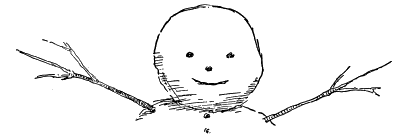
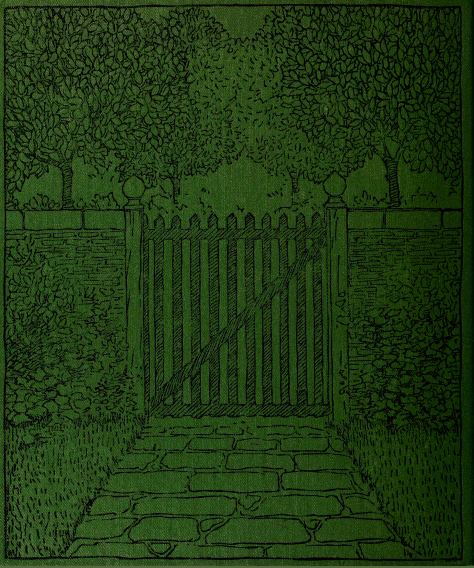
Trancriber Note
Minor typos may have been corrected. Images were moved so as to prevent splitting paragraphs. All images were derived from materials made available on The Internet Archive and the music files were compiled by workers at Distributed Proofreaders. These images and audio files are placed in the Public Domain.
End of Project Gutenberg's A Story Garden for Little Children, by Maud Lindsay
*** END OF THIS PROJECT GUTENBERG EBOOK A STORY GARDEN FOR LITTLE CHILDREN ***
***** This file should be named 62748-h.htm or 62748-h.zip *****
This and all associated files of various formats will be found in:
http://www.gutenberg.org/6/2/7/4/62748/
Produced by Linda Cantoni, Charlene Taylor, Tom Cosmas and
the Online Distributed Proofreading Team at
https://www.pgdp.net (This file was produced from images
generously made available by The Internet Archive/American
Libraries.)
Updated editions will replace the previous one--the old editions will
be renamed.
Creating the works from print editions not protected by U.S. copyright
law means that no one owns a United States copyright in these works,
so the Foundation (and you!) can copy and distribute it in the United
States without permission and without paying copyright
royalties. Special rules, set forth in the General Terms of Use part
of this license, apply to copying and distributing Project
Gutenberg-tm electronic works to protect the PROJECT GUTENBERG-tm
concept and trademark. Project Gutenberg is a registered trademark,
and may not be used if you charge for the eBooks, unless you receive
specific permission. If you do not charge anything for copies of this
eBook, complying with the rules is very easy. You may use this eBook
for nearly any purpose such as creation of derivative works, reports,
performances and research. They may be modified and printed and given
away--you may do practically ANYTHING in the United States with eBooks
not protected by U.S. copyright law. Redistribution is subject to the
trademark license, especially commercial redistribution.
START: FULL LICENSE
THE FULL PROJECT GUTENBERG LICENSE
PLEASE READ THIS BEFORE YOU DISTRIBUTE OR USE THIS WORK
To protect the Project Gutenberg-tm mission of promoting the free
distribution of electronic works, by using or distributing this work
(or any other work associated in any way with the phrase "Project
Gutenberg"), you agree to comply with all the terms of the Full
Project Gutenberg-tm License available with this file or online at
www.gutenberg.org/license.
Section 1. General Terms of Use and Redistributing Project
Gutenberg-tm electronic works
1.A. By reading or using any part of this Project Gutenberg-tm
electronic work, you indicate that you have read, understand, agree to
and accept all the terms of this license and intellectual property
(trademark/copyright) agreement. If you do not agree to abide by all
the terms of this agreement, you must cease using and return or
destroy all copies of Project Gutenberg-tm electronic works in your
possession. If you paid a fee for obtaining a copy of or access to a
Project Gutenberg-tm electronic work and you do not agree to be bound
by the terms of this agreement, you may obtain a refund from the
person or entity to whom you paid the fee as set forth in paragraph
1.E.8.
1.B. "Project Gutenberg" is a registered trademark. It may only be
used on or associated in any way with an electronic work by people who
agree to be bound by the terms of this agreement. There are a few
things that you can do with most Project Gutenberg-tm electronic works
even without complying with the full terms of this agreement. See
paragraph 1.C below. There are a lot of things you can do with Project
Gutenberg-tm electronic works if you follow the terms of this
agreement and help preserve free future access to Project Gutenberg-tm
electronic works. See paragraph 1.E below.
1.C. The Project Gutenberg Literary Archive Foundation ("the
Foundation" or PGLAF), owns a compilation copyright in the collection
of Project Gutenberg-tm electronic works. Nearly all the individual
works in the collection are in the public domain in the United
States. If an individual work is unprotected by copyright law in the
United States and you are located in the United States, we do not
claim a right to prevent you from copying, distributing, performing,
displaying or creating derivative works based on the work as long as
all references to Project Gutenberg are removed. Of course, we hope
that you will support the Project Gutenberg-tm mission of promoting
free access to electronic works by freely sharing Project Gutenberg-tm
works in compliance with the terms of this agreement for keeping the
Project Gutenberg-tm name associated with the work. You can easily
comply with the terms of this agreement by keeping this work in the
same format with its attached full Project Gutenberg-tm License when
you share it without charge with others.
1.D. The copyright laws of the place where you are located also govern
what you can do with this work. Copyright laws in most countries are
in a constant state of change. If you are outside the United States,
check the laws of your country in addition to the terms of this
agreement before downloading, copying, displaying, performing,
distributing or creating derivative works based on this work or any
other Project Gutenberg-tm work. The Foundation makes no
representations concerning the copyright status of any work in any
country outside the United States.
1.E. Unless you have removed all references to Project Gutenberg:
1.E.1. The following sentence, with active links to, or other
immediate access to, the full Project Gutenberg-tm License must appear
prominently whenever any copy of a Project Gutenberg-tm work (any work
on which the phrase "Project Gutenberg" appears, or with which the
phrase "Project Gutenberg" is associated) is accessed, displayed,
performed, viewed, copied or distributed:
This eBook is for the use of anyone anywhere in the United States and
most other parts of the world at no cost and with almost no
restrictions whatsoever. You may copy it, give it away or re-use it
under the terms of the Project Gutenberg License included with this
eBook or online at www.gutenberg.org. If you are not located in the
United States, you'll have to check the laws of the country where you
are located before using this ebook.
1.E.2. If an individual Project Gutenberg-tm electronic work is
derived from texts not protected by U.S. copyright law (does not
contain a notice indicating that it is posted with permission of the
copyright holder), the work can be copied and distributed to anyone in
the United States without paying any fees or charges. If you are
redistributing or providing access to a work with the phrase "Project
Gutenberg" associated with or appearing on the work, you must comply
either with the requirements of paragraphs 1.E.1 through 1.E.7 or
obtain permission for the use of the work and the Project Gutenberg-tm
trademark as set forth in paragraphs 1.E.8 or 1.E.9.
1.E.3. If an individual Project Gutenberg-tm electronic work is posted
with the permission of the copyright holder, your use and distribution
must comply with both paragraphs 1.E.1 through 1.E.7 and any
additional terms imposed by the copyright holder. Additional terms
will be linked to the Project Gutenberg-tm License for all works
posted with the permission of the copyright holder found at the
beginning of this work.
1.E.4. Do not unlink or detach or remove the full Project Gutenberg-tm
License terms from this work, or any files containing a part of this
work or any other work associated with Project Gutenberg-tm.
1.E.5. Do not copy, display, perform, distribute or redistribute this
electronic work, or any part of this electronic work, without
prominently displaying the sentence set forth in paragraph 1.E.1 with
active links or immediate access to the full terms of the Project
Gutenberg-tm License.
1.E.6. You may convert to and distribute this work in any binary,
compressed, marked up, nonproprietary or proprietary form, including
any word processing or hypertext form. However, if you provide access
to or distribute copies of a Project Gutenberg-tm work in a format
other than "Plain Vanilla ASCII" or other format used in the official
version posted on the official Project Gutenberg-tm web site
(www.gutenberg.org), you must, at no additional cost, fee or expense
to the user, provide a copy, a means of exporting a copy, or a means
of obtaining a copy upon request, of the work in its original "Plain
Vanilla ASCII" or other form. Any alternate format must include the
full Project Gutenberg-tm License as specified in paragraph 1.E.1.
1.E.7. Do not charge a fee for access to, viewing, displaying,
performing, copying or distributing any Project Gutenberg-tm works
unless you comply with paragraph 1.E.8 or 1.E.9.
1.E.8. You may charge a reasonable fee for copies of or providing
access to or distributing Project Gutenberg-tm electronic works
provided that
* You pay a royalty fee of 20% of the gross profits you derive from
the use of Project Gutenberg-tm works calculated using the method
you already use to calculate your applicable taxes. The fee is owed
to the owner of the Project Gutenberg-tm trademark, but he has
agreed to donate royalties under this paragraph to the Project
Gutenberg Literary Archive Foundation. Royalty payments must be paid
within 60 days following each date on which you prepare (or are
legally required to prepare) your periodic tax returns. Royalty
payments should be clearly marked as such and sent to the Project
Gutenberg Literary Archive Foundation at the address specified in
Section 4, "Information about donations to the Project Gutenberg
Literary Archive Foundation."
* You provide a full refund of any money paid by a user who notifies
you in writing (or by e-mail) within 30 days of receipt that s/he
does not agree to the terms of the full Project Gutenberg-tm
License. You must require such a user to return or destroy all
copies of the works possessed in a physical medium and discontinue
all use of and all access to other copies of Project Gutenberg-tm
works.
* You provide, in accordance with paragraph 1.F.3, a full refund of
any money paid for a work or a replacement copy, if a defect in the
electronic work is discovered and reported to you within 90 days of
receipt of the work.
* You comply with all other terms of this agreement for free
distribution of Project Gutenberg-tm works.
1.E.9. If you wish to charge a fee or distribute a Project
Gutenberg-tm electronic work or group of works on different terms than
are set forth in this agreement, you must obtain permission in writing
from both the Project Gutenberg Literary Archive Foundation and The
Project Gutenberg Trademark LLC, the owner of the Project Gutenberg-tm
trademark. Contact the Foundation as set forth in Section 3 below.
1.F.
1.F.1. Project Gutenberg volunteers and employees expend considerable
effort to identify, do copyright research on, transcribe and proofread
works not protected by U.S. copyright law in creating the Project
Gutenberg-tm collection. Despite these efforts, Project Gutenberg-tm
electronic works, and the medium on which they may be stored, may
contain "Defects," such as, but not limited to, incomplete, inaccurate
or corrupt data, transcription errors, a copyright or other
intellectual property infringement, a defective or damaged disk or
other medium, a computer virus, or computer codes that damage or
cannot be read by your equipment.
1.F.2. LIMITED WARRANTY, DISCLAIMER OF DAMAGES - Except for the "Right
of Replacement or Refund" described in paragraph 1.F.3, the Project
Gutenberg Literary Archive Foundation, the owner of the Project
Gutenberg-tm trademark, and any other party distributing a Project
Gutenberg-tm electronic work under this agreement, disclaim all
liability to you for damages, costs and expenses, including legal
fees. YOU AGREE THAT YOU HAVE NO REMEDIES FOR NEGLIGENCE, STRICT
LIABILITY, BREACH OF WARRANTY OR BREACH OF CONTRACT EXCEPT THOSE
PROVIDED IN PARAGRAPH 1.F.3. YOU AGREE THAT THE FOUNDATION, THE
TRADEMARK OWNER, AND ANY DISTRIBUTOR UNDER THIS AGREEMENT WILL NOT BE
LIABLE TO YOU FOR ACTUAL, DIRECT, INDIRECT, CONSEQUENTIAL, PUNITIVE OR
INCIDENTAL DAMAGES EVEN IF YOU GIVE NOTICE OF THE POSSIBILITY OF SUCH
DAMAGE.
1.F.3. LIMITED RIGHT OF REPLACEMENT OR REFUND - If you discover a
defect in this electronic work within 90 days of receiving it, you can
receive a refund of the money (if any) you paid for it by sending a
written explanation to the person you received the work from. If you
received the work on a physical medium, you must return the medium
with your written explanation. The person or entity that provided you
with the defective work may elect to provide a replacement copy in
lieu of a refund. If you received the work electronically, the person
or entity providing it to you may choose to give you a second
opportunity to receive the work electronically in lieu of a refund. If
the second copy is also defective, you may demand a refund in writing
without further opportunities to fix the problem.
1.F.4. Except for the limited right of replacement or refund set forth
in paragraph 1.F.3, this work is provided to you 'AS-IS', WITH NO
OTHER WARRANTIES OF ANY KIND, EXPRESS OR IMPLIED, INCLUDING BUT NOT
LIMITED TO WARRANTIES OF MERCHANTABILITY OR FITNESS FOR ANY PURPOSE.
1.F.5. Some states do not allow disclaimers of certain implied
warranties or the exclusion or limitation of certain types of
damages. If any disclaimer or limitation set forth in this agreement
violates the law of the state applicable to this agreement, the
agreement shall be interpreted to make the maximum disclaimer or
limitation permitted by the applicable state law. The invalidity or
unenforceability of any provision of this agreement shall not void the
remaining provisions.
1.F.6. INDEMNITY - You agree to indemnify and hold the Foundation, the
trademark owner, any agent or employee of the Foundation, anyone
providing copies of Project Gutenberg-tm electronic works in
accordance with this agreement, and any volunteers associated with the
production, promotion and distribution of Project Gutenberg-tm
electronic works, harmless from all liability, costs and expenses,
including legal fees, that arise directly or indirectly from any of
the following which you do or cause to occur: (a) distribution of this
or any Project Gutenberg-tm work, (b) alteration, modification, or
additions or deletions to any Project Gutenberg-tm work, and (c) any
Defect you cause.
Section 2. Information about the Mission of Project Gutenberg-tm
Project Gutenberg-tm is synonymous with the free distribution of
electronic works in formats readable by the widest variety of
computers including obsolete, old, middle-aged and new computers. It
exists because of the efforts of hundreds of volunteers and donations
from people in all walks of life.
Volunteers and financial support to provide volunteers with the
assistance they need are critical to reaching Project Gutenberg-tm's
goals and ensuring that the Project Gutenberg-tm collection will
remain freely available for generations to come. In 2001, the Project
Gutenberg Literary Archive Foundation was created to provide a secure
and permanent future for Project Gutenberg-tm and future
generations. To learn more about the Project Gutenberg Literary
Archive Foundation and how your efforts and donations can help, see
Sections 3 and 4 and the Foundation information page at
www.gutenberg.org
Section 3. Information about the Project Gutenberg Literary Archive Foundation
The Project Gutenberg Literary Archive Foundation is a non profit
501(c)(3) educational corporation organized under the laws of the
state of Mississippi and granted tax exempt status by the Internal
Revenue Service. The Foundation's EIN or federal tax identification
number is 64-6221541. Contributions to the Project Gutenberg Literary
Archive Foundation are tax deductible to the full extent permitted by
U.S. federal laws and your state's laws.
The Foundation's principal office is in Fairbanks, Alaska, with the
mailing address: PO Box 750175, Fairbanks, AK 99775, but its
volunteers and employees are scattered throughout numerous
locations. Its business office is located at 809 North 1500 West, Salt
Lake City, UT 84116, (801) 596-1887. Email contact links and up to
date contact information can be found at the Foundation's web site and
official page at www.gutenberg.org/contact
For additional contact information:
Dr. Gregory B. Newby
Chief Executive and Director
[email protected]
Section 4. Information about Donations to the Project Gutenberg
Literary Archive Foundation
Project Gutenberg-tm depends upon and cannot survive without wide
spread public support and donations to carry out its mission of
increasing the number of public domain and licensed works that can be
freely distributed in machine readable form accessible by the widest
array of equipment including outdated equipment. Many small donations
($1 to $5,000) are particularly important to maintaining tax exempt
status with the IRS.
The Foundation is committed to complying with the laws regulating
charities and charitable donations in all 50 states of the United
States. Compliance requirements are not uniform and it takes a
considerable effort, much paperwork and many fees to meet and keep up
with these requirements. We do not solicit donations in locations
where we have not received written confirmation of compliance. To SEND
DONATIONS or determine the status of compliance for any particular
state visit www.gutenberg.org/donate
While we cannot and do not solicit contributions from states where we
have not met the solicitation requirements, we know of no prohibition
against accepting unsolicited donations from donors in such states who
approach us with offers to donate.
International donations are gratefully accepted, but we cannot make
any statements concerning tax treatment of donations received from
outside the United States. U.S. laws alone swamp our small staff.
Please check the Project Gutenberg Web pages for current donation
methods and addresses. Donations are accepted in a number of other
ways including checks, online payments and credit card donations. To
donate, please visit: www.gutenberg.org/donate
Section 5. General Information About Project Gutenberg-tm electronic works.
Professor Michael S. Hart was the originator of the Project
Gutenberg-tm concept of a library of electronic works that could be
freely shared with anyone. For forty years, he produced and
distributed Project Gutenberg-tm eBooks with only a loose network of
volunteer support.
Project Gutenberg-tm eBooks are often created from several printed
editions, all of which are confirmed as not protected by copyright in
the U.S. unless a copyright notice is included. Thus, we do not
necessarily keep eBooks in compliance with any particular paper
edition.
Most people start at our Web site which has the main PG search
facility: www.gutenberg.org
This Web site includes information about Project Gutenberg-tm,
including how to make donations to the Project Gutenberg Literary
Archive Foundation, how to help produce our new eBooks, and how to
subscribe to our email newsletter to hear about new eBooks.